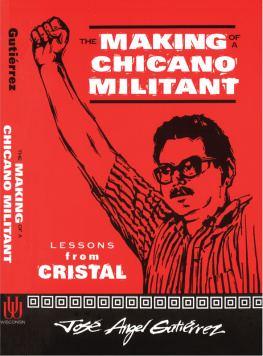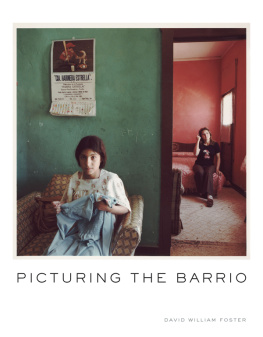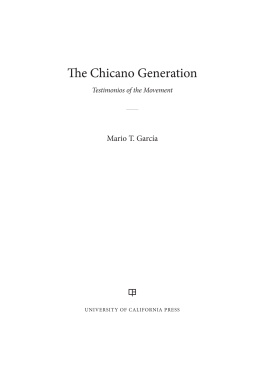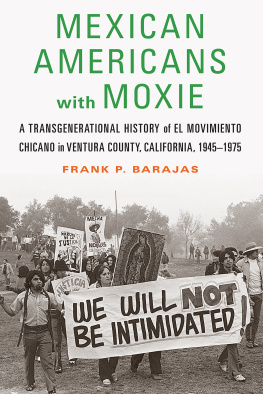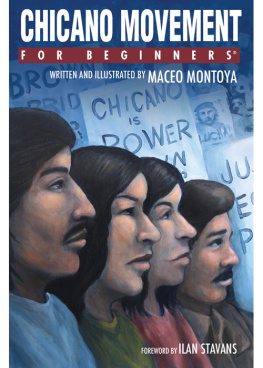A Century of Chicano History
Empire, Nations, and Migration
Gilbert G. Gonzalez | Raul A. Fernandez |
Professor | Professor |
University of California, Irvine | University of California, Irvine |
ROUTLEDGE
NEW YORK AND LONDON
Published in 2003 by
Routledge
29 West 35th Street
New York, NY 10001
www.routledge-ny.com
Published in Great Britain by
Routledge
11 New Fetter Lane
London EC4P 4EE
www.routledge.co.uk
Copyright 2003 by Routledge
Routledge is an imprint of the Taylor & Francis Group.
Transferred to Digital Printing 2007
All rights reserved. No part of this book may be reprinted or reproduced or utilized in any form or by any electronic, mechanical, or other means, now known or hereafter invented, including photocopying and recording, or in any information storage or retrieval system, without permission in writing from the publishers.
The following chapters were previously published in The Pacific Historical Review:
Chicano History: Transcending Cultural Models (Vol. 63, No. 4, 1994)
1994 by the Pacific Coast Branch, American Historical Association
Reprinted from Pacific Historical Review
Vol. 63, No. 4, by permission of the University of California Press
Empire and the Origins of Twentieth Century Migration from Mexico to the
United States (Vol. 71, no. 1, 2002)
2002 by the Pacific Coast Branch, American Historical Association
Reprinted from Pacific Historical Review
Vol. 71, No. 1, by permission of the University of California Press
Library of Congress Cataloging-in-Publication Data
Gonzalez, Gilbert G., 1941
A century of Chicano history: empire, nations, and migration / Gilbert G. Gonzalez, Raul A. Fernandez.
p. cm.
Includes index.
ISBN 0-415-94392-2 ISBN 0-415-94393-0 (pbk.) ISBN 978-1-136-07170-6 (ePub)
1. Mexican AmericansHistory19th century. 2. Mexican AmericansHistory 20th century. 3. ImmigrantsUnited StatesHistory19th century. 4. Immigrants United StatesHistory20th century. 5. United StatesRelationsMexico. 6. MexicoRelationsUnited States. 7. MexicoEmigration and immigrationHistory. 8. United StatesEmigration and immigrationHistory. I. Fernandez, Raul A., 1945II. Title.
E184.M5G645 2003
973'.046872dc21
2002037050
he [the migrant] is forced to seek better conditions north of the border by the slow but relentless pressure of United States agricultural, financial and oil corporate interests on the entire economic and social evolution of the Mexican nation.
Ernesto Galarza, 1949
Contents
Acknowledgments
We have many to thank for their numerous unselfish contributions that assisted us to make this book better than we alone could ever have achieved. Colleagues, friends, and family deserve our heartfelt thanks. At the University of California, Irvine, we benefited from the support of fellow faculty, students, and staff, among them John Liu, Ester Hernandez, Jeanette Castellanos, Louis Desipio, Anna Gonzales, Ken Pomeranz, Patricia Hamm, Barbara Abell, Gillian Kumm, Edna Mejia, Stella Ginez, and the faculty and students in the Labor Studies Program and Chicano Latino Studies Program. From beyond the walls of UC Irvine, the critical commentary of Jon Panish, Gema Guevara, John Mason Hart, David Johnson, Richard Gibson, Myrna Donohoe, Victor Quintana, Henry Pope Anderson, and Jos Alamillo helped us to clarify and strengthen our arguments. Finally, we wish to thank two very special colleagues who helped in no small measure to improve our book. Our thoughts are with two departed colleagues, Jeffrey Garcilazo and Lionel Cantu. Lionel gladly loaned his books and offered his critical ideas without hesitation, and Jeffs dissertation was a most valuable source of information, which we depended upon on numerous occasions.
More than critical insights were at play: we were privileged to have the unwavering support of our respective partners, each expert in her particular field. Frances Leslie and Nancy Page Fernandez assisted with their active collaboration at several key junctures. Among other contributions, Nancy recommended readings, which assisted in developing key chapters in the book, and Frances prepared the illustrations. Both were often abruptly put on notice to hear our ideas, frequently in incipient stages of maturation, and to make sense of them. Their observations usually invariably led to further conceptual development.
Research requires financial assistance, and this work depended on the backing of a number of support programs. The University of California SCR 43 research funds administered via the UCI Chicano Latino Studies Program as well as support from the UCI Committee on Research and the UCI Labor Studies Program made possible the completion of critical phases of the research. We are particularly indebted to the staff at the UCI Main Library Interlibrary Loan Department, who always responded positively to the many requests for materials used in writing this book.
Last, we express our deep appreciation to the editorial staff at Routledge, in particular Karen Wolny and Sara Folks. They were a pleasure to work with and helped us steer the manuscript from draft to book. Not only the editorial staff deserves mention; the outside press reviewers also offered valuable commentary and suggestions for improvement, which after careful evaluation and selection we incorporated.
Introduction
One Hundred Years of Chicano History
This book explores the origins of the increasing Mexican-American population of the United States. We show how more than a century of economic domination of the United States over Mexico continues to produce economic and social dislocations, which are at the root of the mass northward migration of Mexicans to the United States, a constant wellspring of the Chicano population.
This work itself has been in the making for the past ten years. In the early 1990s, dissatisfied with the one-sided, culture-based approach of much of Chicano historiography, we set out to review and critique that body of writing. In addition, we sought to identify economic-historic structures as a guide to contextualize Chicano social and cultural history. After a prolonged period of manuscript revisions, we published an article, appearing in the


